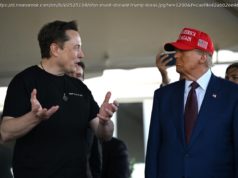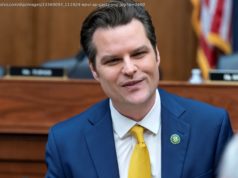Ron DeSantis’s failed campaign ‘asked Trump’s base to select a more competent leader, and in return conceded every moral and philosophical objection to Trump any Republican still clung to,’ writes Jonathan Chait.
In the fall of 2022, I covered the National Conservatism Conference, a soiree in Miami drawing Republican activists, writers, activists, and elected officials. The conference made two things vividly clear. First was the degree to which post-liberalism — the idea that traditional democracy was failing, and Republicans must use coercive government power to gain and hold power — had moved from the fringes to the mainstream of the conservative movement. The second was that the most ardently post-liberal conservative activists, the ones who believed the Deep State had sabotaged Donald Trump and openly envied Hungary’s strongman Viktor Orban, had grown convinced Ron DeSantis was their candidate.
The Florida governor spoke to a rapturous audience at the convention. Even though his landslide reelection victory still lay ahead of him, you could see the gears of elite influence turning. The energies revealed and unleashed by Trump were now consolidating behind a new movement, and at that moment it all seemed to be lining up behind DeSantis.
We know now, and have known for quite some time, that the flesh-and-blood DeSantis could not live up to the expectations heaped upon him. He was, both figuratively and literally, too small — making inept tactical decisions, failing at attempts to do things like smile, laugh, and banter with regular people, and probably doomed from the outset by the durability of the Trump personality cult. He dropped out of the race on Sunday.
But as pathetic and ridiculous and small as the procession of spousal handshakes, custom-built lift boots, awkward laughs, spoonless puddings may have been, the DeSantis campaign was not unimportant. It represented something that will have lasting significance: the ratification of Trumpism by the conservative movement and the Republican Party.
Who is permitted in the coalition is a vital question for any political body, especially one with dangerous extremists. On the American right, that question has hung in the balance since Trump came on the scene. DeSantis’s campaign put it finally to rest.
It is difficult to overestimate the panic and existential dread Trump’s rise set off within the GOP elite. It was not merely Trump’s personality or ideological unreliability that terrorized Republican politicians and thought leaders. The National Review’s famous “Against Trump” issue, in which a collection of paragons of conservatism dismissed Trump as a con man and read him out of the movement, embodied what was at the time a wall of opposition.
The conservative movement’s initial rejection of Trump set off what was, internally, a catastrophic series of events. The movement depended on the assumption that its existing organizations spoke for “the base,” yet Trump had mobilized a vast new army of followers who were transparently at odds with the priorities of their self-appointed leaders.
Start
United States
USA — mix Ron DeSantis Finalized the Conservative Movement’s Capitulation to Trump






